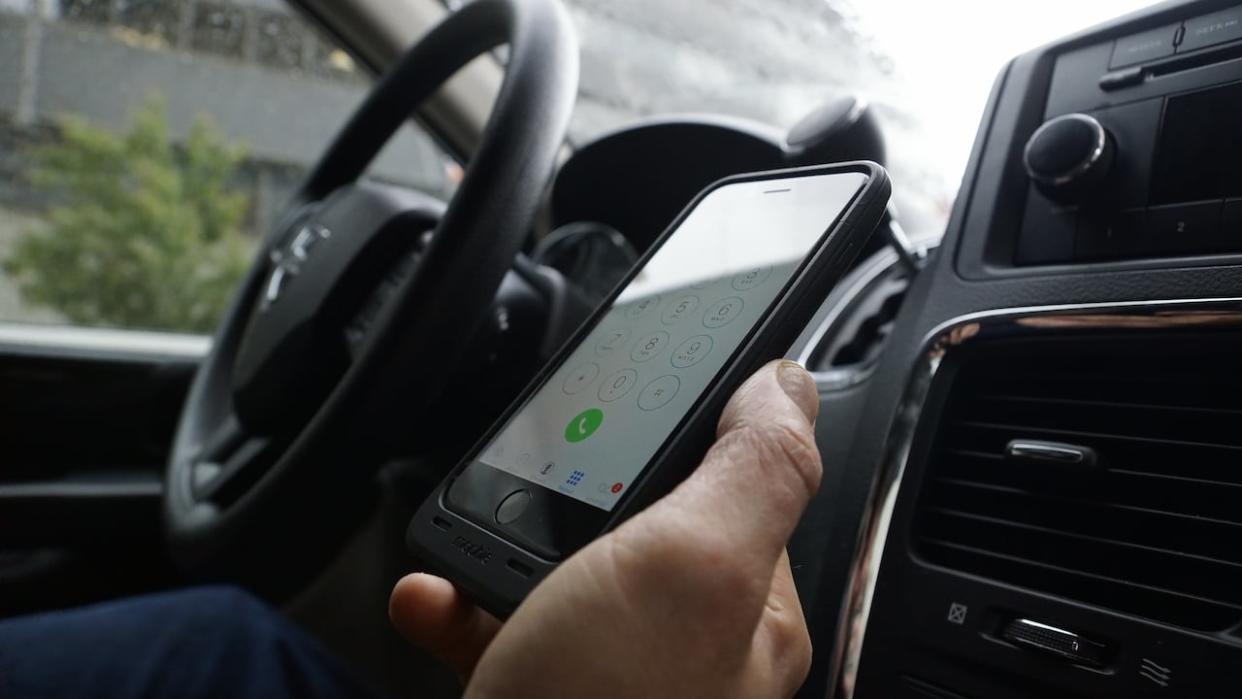Drivers in Edmonton convicted of distracted driving at 3 to 4 times the rate of Calgary

Calgary drivers are being penalized for distracted driving far less often than drivers in Edmonton, but experts say that's more likely due to differences in enforcement than differences in driver behaviour between the two cities.
There have been about 1,450 convictions per year, on average, over the past three full years on record in Calgary, according to data compiled by the provincial government.
That compares to nearly 3,900 convictions per year over the same time period in Edmonton, where there are fewer licensed drivers.
Dominic Schamuhn, manager of advocacy with the Alberta Motor Association (AMA), says it's unlikely the difference is due to Calgary drivers being significantly more law-abiding than Edmonton drivers when it comes to using cellphones or other digital devices behind the wheel.
"Distracted driving is everywhere," he said. "We only need to look around us to see that this issue clearly hasn't gone away."
Rather, Schamuhn believes "enforcement in one community was maybe a little more active than in another."
Calgary police don't dispute that.
No targets or 'blitzes' in Calgary
Distracted driving has been against the law in Alberta for more than a decade now and enforcement practices have changed over the years.
These days, police in Calgary say they are currently emphasizing driver education and doing enforcement on a "situation-specific" basis.
"At the moment, we don't have a specific enforcement target," said acting Staff Sgt. Colin Foster with the Calgary Police Service (CPS) traffic section.

Acting Staff Sgt. Colin Foster with the Calgary Police Service's traffic section in an interview via video chat. (Google Meet/Screenshot)
"If an officer sees somebody on a cellphone, you're possibly going to get pulled over and given a ticket," Foster said. "There's no blitz that we are taking part in at the moment. So that will possibly account for some of the discrepancy between jurisdictions within Alberta."
Edmonton police set targets for distracted driving tickets in the past, according to published policing plans dating back to 2017 and prior, but it's unclear if there are similar targets today. The Edmonton Police Service declined to be interviewed for this story.
Edmonton police did tell CBC News last year that they occasionally run operations where an officer is posted on a median or curb to note distracted drivers and then radio to other officers to pull them over.
Police in Edmonton also conduct periodic traffic-enforcement blitzes known as "Operation 24 Hours," which are not specifically aimed at distracted driving but often do result in some distracted-driving tickets being issued.
General decline, but especially in Calgary
Convictions for distracted driving have been on the decline, in general, in Alberta over the past decade or so, but the decline has been especially steep in Calgary.
Distracted driving convictions have declined in Edmonton as well, but not as quickly.
On a per-driver basis, the rate of convictions in Edmonton has been triple or quadruple that of Calgary over the past few years.
Foster says part of the decline in Calgary over the past few years was likely related to the fact that fewer people were out on the roads during the COVID-19 pandemic.
Since public-health restrictions have been lifted and traffic has increased, he said it's possible that there will be an uptick in tickets in Calgary this year.
"We're still trying to educate a lot more than necessarily enforce," he noted.
Foster said Calgary police do education campaigns in schools as well as in partnership with the AMA to raise public awareness about the dangers of distracted driving.
Enforcement challenges
The nature of distracted driving means it's not as easily enforced as some other traffic violations, such as speeding, which can be carried out automatically through photo radar.
"There is some difficulty for law enforcement in actually prosecuting this crime," said Schamuhn with the AMA.
"We know that there are some barriers of proof and that's something law enforcement has to navigate through the judicial system as well."
As a result, he said police have to go to greater lengths both to issue tickets for distracted driving and also to have those tickets stand up in court, if challenged.
The City of Edmonton and Edmonton Police Service partnered with the University of Alberta last year to test an automated system of enforcement that uses high-resolution cameras and machine learning to distinguish between photos of drivers who were distracted and those who were not.
The system was only used for testing and did not see drivers actually ticketed.
Penalties and peer pressure
Schamuhn says fear of enforcement is not the only motivating factor that gets drivers to put their cellphones away, but it's an important one.
He notes the current penalty for distracted driving — a $300 ticket and three demerit points — is more stringent than when the law was first introduced, but not as stringent as the penalties for impaired driving, which include vehicle impoundment and criminal charges.
"We know from our research that there is some impact on drivers of knowing that they could receive a penalty and for some people that's the reason they choose not to do it," he said. "And so it's fair to say that there's some room for improvement in the current fines and penalties for distracted driving in Alberta."

Dominic Schamuhn, manager of advocacy with the Alberta Motor Association. (Google Meet/Screenshot)
He said another motivating factor, however, is driving culture and social norms, which can evolve over time.
"We saw that shift with impaired driving where it used to be a little more common than it is now, but there was also a little bit more acceptance," Schamuhn said.
"There's a broad understanding now that that impaired driving is entirely wrong and it's entirely preventable and we're seeing that begin to take shape with distracted driving as well."
'Don't look at it. Concentrate on driving'
Police and researchers in other provinces have put distracted driving on par with — or worse than — impaired driving and speeding when it comes to risk on the roads.
Foster, with the Calgary police, says a lot of drivers don't realize just how long their attention is diverted when they give in to the urge to check a notification on their phone.
He says research suggests that action distracts people for about five seconds, on average.
Driving at 100 km/h, you will travel about 140 metres — roughly the length of a CFL football field, including end zones — during those five seconds.
"That's a football field where you're not reacting with what's happening in front of you — and that can have catastrophic consequences," Foster said.
"So although it's tempting — and we get it — put the cellphone away. Put in your handbag. Put it in the console. Put it your jacket pocket. Don't look at it. Concentrate on driving."


